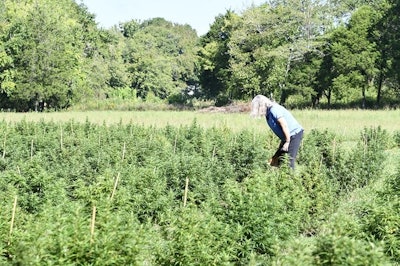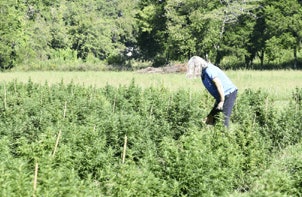

Tennessee was one of the first states to approve a hemp program in May 2014, shortly after the U.S. Congress passed the Agricultural Act of 2014 (the 2014 Farm Bill).
Since then, Tennessee’s hemp program has become one of the leading in the country, with nearly 2,000 licensed hemp growers cultivating in 93 of the state’s 95 counties as of March 2021, according to Kim Doddridge, the public information officer at the Tennessee Department of Agriculture (TDA).
So, what makes The Volunteer State appealing to hemp farmers?
From its natural resources to its laws, the state provides hemp farmers opportunities for success, says Denise Woods, the state’s hemp program coordinator.
Kelley Mathis Hess, executive director and lobbyist for the Tennessee Growers Coalition, agrees with Woods and believes the state is one of the best regulatory environments for hemp in the country.
“The department of agriculture has done a great job of regulating but not putting up a lot of barriers for people to participate, and not just [for] farmers, but the entire industry,” Hess says.
After the 2014 Farm Bill passed, the state took the necessary steps to ensure that using cannabidiol [CBD] was legal for consumers. And in 2019, the state was the first to outright legalize smokable hemp by putting a statute in place that allows any person who is 21 or older to consume it.
Aside from the state’s laws and regulations, Woods says: “I think one of Tennessee’s biggest advantages is its soil and climate. And the amount of hemp that our farmers have produced in the last several years is a testament to that.”

Just last year, the state licensed 15,722 acres for hemp cultivation, according to Woods (although farmers only wound up growing around 4,836 acres of hemp). Based on 2020 data compiled by Hemp Grower, Tennessee had the 8th highest number of acres licensed for hemp out of all 50 states.
“The weather is mild, and the soil is diverse,” Woods says. “Farmers can go from the Delta land in the west, to Middle Tennessee, to mountain areas in the east. Wherever it is, the soil is good to grow hemp, and the climate is conducive to growing a good product.”
Although the mild climate is an ideal growing condition for hemp, Tennessee farmers face one challenge: the humidity. But Woods says farmers have identified this issue and made accommodations for the way they store and hang hemp.
“There were fungal diseases found in the field due to humidity and mold issues due to improper storage,” Woods says. “These issues are not exclusive to Tennessee. Farmers have since realized that good air flow is essential for hemp to maintain its integrity. Unlike tobacco, hemp must be spaced apart to allow for good air flow, and many times, fans are used.”
Due to the state’s diversity in climate and resources, there is no particular region where hemp grows best, Woods says.
“If you define ‘best’ as a place where a certain seed grows best—maybe a seed that likes cooler temperatures and a lighter spring—then you’ll see that in East Tennessee,” she says. “But if you define ‘best’ as a variety that grows best in hot temperatures with different soil, then you’ll see that in West Tennessee.”
Helping Growers Settle Into a New Industry
Whether a farmer is experienced, generational or brand new, Woods says the state aims to provide the necessary resources to help all growers succeed.
For example, Tennessee has continued to operate under the 2014 Farm Bill despite the Agriculture Improvement Act of 2018 (the 2018 Farm Bill) taking effect Dec. 20, 2018, and the U.S. Department of Agriculture (USDA) issuing its final rule on hemp this January. Instead of switching to operating under the new regulations, the TDA thought it would best benefit growers to remain under the pilot program for now. (States have until Jan. 1, 2022, to switch from their pilot programs to operating under the USDA’s final rule on hemp.)
The state submitted a hemp plan last year, and the USDA approved it in July 2020; however, state authorities changed their minds and decided to move forward operating under the 2014 Farm Bill instead. The state is planning to re-submit a plan to the USDA by summer, Woods says.
“Continuing under the pilot program gave our growers another year of knowing what to expect, to develop their programs, to ensure they can find and develop genetics that would test under the legal 0.3% THC [tetrahydrocannabinol] limit and more,” Woods says. “Our program changes every year too, so it just gave another year of minimal change to growers, so they could get on their feet and not have to scramble to comply.”

Woods says the TDA has made changes to the state’s hemp program over the years to better serve growers and to comply with the changing federal and state laws, rules and regulations.
“Hemp is a new industry that is impacted by many different stakeholders,” Woods says. “As the hemp industry evolves, so follows the program.”
The state also tries to ensure that anyone who works with growers has the resources and knowledge needed to communicate with them effectively, Woods says.
“Tennessee realizes that hemp intersects with many different departments and programs, and hemp is not only new to the department of agriculture, but to everyone,” Woods says.
The state conducts regular training with the Tennessee Department of Revenue and sends nearly 20 TDA plant inspectors out into the field every day.
“Tennessee has many indoor growing operations, which necessitates the inspectors being in the field year-round,” Woods says. “… By being a helpful presence, the Tennessee Department of Ag has developed an energetic working relationship with the growers.”
Additionally, several state universities, such as the University of Tennessee Institute of Agriculture (UTIA), Tennessee State University (TSU), and Middle Tennessee State University (MTSU), participate in hemp research and conduct variety trials, Woods says.
“We do all of this just so when our farmers talk to us, we can respect and appreciate everybody’s needs and expertise,” she says.
“I see a lot of brand-new farmers breaking into the industry, which is so exciting,” Woods adds. “And I think that plays into the energy Tennessee has.”
Woods says the state has created an opportunity for many to join the hemp program by keeping requirements minimal and fees reasonable.
“The opportunity to grow hemp brought both novice and experience to the agricultural table,” Woods says. “It was a level playing field since there were no ‘experienced Tennessee hemp farmers.’ Hemp brought together a diverse community that needed each other. Learning, succeeding and failing, working hard, sharing info, dreaming and hoping all created energy. This new crop, with its new vocabulary, new ideas, new uses, and new possibilities, added to the energy.”
The state has made additional efforts to bolster hemp, Woods says, including increasing human resources, adding a business development consultant, partnering with The Hemp Alliance of Tennessee and adding hemp to a list of TDA-promoted crops. These are “all proof of Tennessee’s hospitality and commitment to contributions to making Tennessee a national leader in the industry,” she adds.
In turn, Tennessee hemp farmers have become true entrepreneurs and created a market where one didn’t previously exist, Woods says.
As the industry continues to progress and grow, Woods is excited about what the state’s hemp industry may look like in the coming years.
“However we define the future, however our growers define the future, or wherever the industry or our vision leads us, will be the future of hemp in Tennessee,” Woods says.














